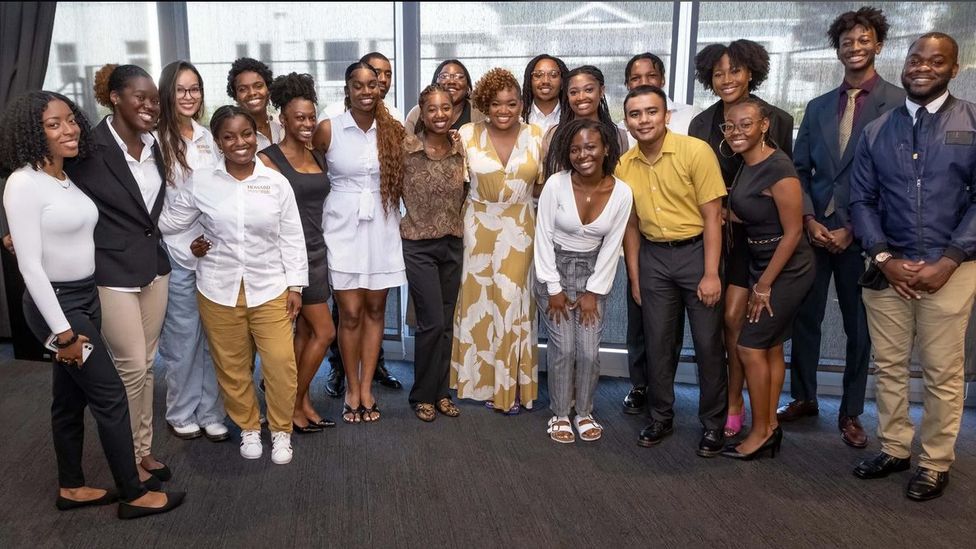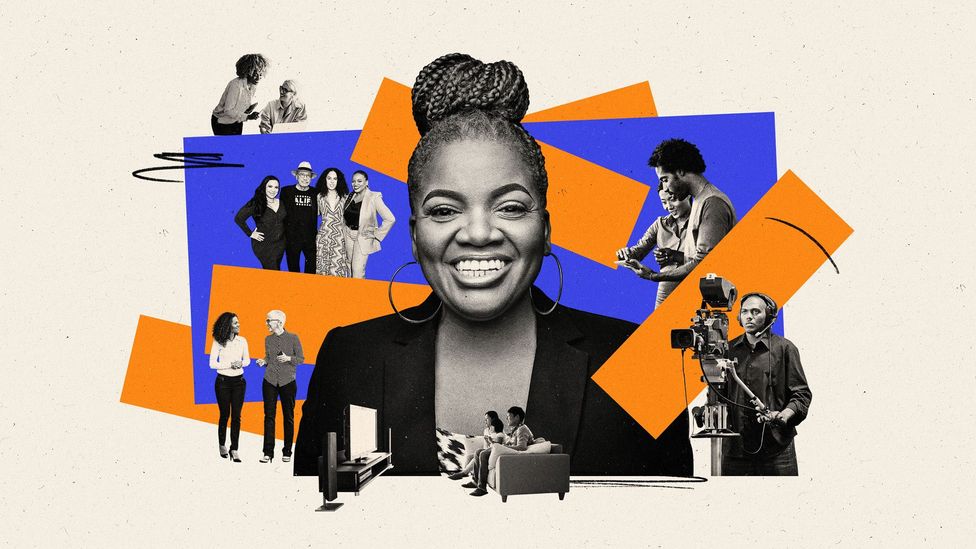Latasha Gillespie knows inclusivity isn't one-sided. At Amazon MGM, the film and television production and distribution studio, she's a staunch believer that representation needs to be both in front of the camera and behind it.
In a first in the entertainment industry, the company launched its inclusion policy guide and playbook under Gillespie's leadership as head of global diversity, equity, inclusion and accessibility. These resources – fully available to the public – aim to guide leaders both within Amazon MGM and the entire business landscape to ensure diverse, accurate storytelling.
"Our policy guide and playbook codify the DEI work we've been doing internally. In terms of formulating a practical approach to DEI, we've done most of the heavy lifting for other business leaders," she tells the BBC.
Gillespie's work comes at a pivot point in society for diversity, equity and inclusion. The term "DEI" is increasingly in the crosshairs amid a growing backlash from some powerful figures in corporate America. Gillespie knows the landscape is as politically charged as ever. But instead of bristling at the challenge, it's energised her more.
Gillespie talks to the BBC about her outlook on representation, the role of data in diversity and her plan to move the entertainment industry towards a more inclusive future.
Executive Lounge
The BBC's series features interviews with executive leaders making innovative, data-driven decisions helping shape the future of business – and paving the path for other leaders to thrive. Read more conversations here.
What does organisational DEI look like, and what is the biggest barrier to achieving it?
Organisational DEI promotes the equitable representation and participation of all employees irrespective of their race, gender, religion, sexual orientation, disability and the like.
The biggest obstacle to achieving it is the mindset people sometimes adopt when they hear the words "diversity", "equity" and "inclusion". They mistakenly believe it's focused solely on race, gender or social justice.
In reality, DEI is a core growth strategy that helps businesses and organisations alike become more profitable by identifying customers and global expansion opportunities. It also aids companies' understanding of customers, potential customers and markets, which allows them to create products and provide services that meet their customers' needs.
You created and launched Amazon MGM Studios' inclusion policy guide and playbook, which extend the company's DEI commitments to content and productions. How did the idea come about?
Following the murder of George Floyd and the subsequent uprising against racial injustice, it was important that our efforts weren't performative. This wasn't the time to just give to charity or start another mentoring program, as well-intentioned and important as these efforts are.
In this instance, we knew we had to dismantle corporate systems, processes and structures that have historically discriminated against minorities and other marginalised groups. On this basis, we decided to make our internal DEI commitments public, which enabled us to be held accountable. This is how our policy guide and playbook came into being.
The policy guide can be likened to an overarching DEI mission statement. It's a broad overview of the aspirational DEI goals we set, which also explains how we're holding ourselves accountable for achieving them. On the other hand, the playbook is similar to a DEI manual. It's a detailed, step-by-step resource for businesses and organisations with worthy DEI goals, but don't know how to go about achieving them.

Amazon MGM Studios partnered with Howard University to create a programme for marginalised students to train alongside entertainment executives (Credit: Courtesy of Amazon MGM)
The playbook is an open-source document, which enables third parties outside Amazon MGM Studios to contribute to its development. How did you create the playbook and what were the drivers behind the decision to make it open source?
To make the playbook, we asked our partners, creative executives and content creators to review our playbook template and tell us what was likely to work and what wasn't, so we could figure out exactly how to get it right. We knew the playbook would only be effective if we did the work together.
We [made the document public] to enable business leaders without a specific DEI framework in place to use, study or change the playbook to make it fit for purpose. This way, everyone can benefit from it – after all, a rising tide lifts all boats.
How does data underpin DEI initiatives at Amazon MGM Studios?
I work for a data-driven company. This is important because, as the saying goes, "what gets measured gets done".
We collect data to not only understand what's happening in front of the camera but, crucially, what's happening behind it, too. While it's great to see diverse on-screen representation and have a window into someone else's lived experiences, if there's little or no diversity in the decision-making seats behind the camera, this can adversely affect the authenticity of the lived experiences being depicted on-screen.
Diversity behind the camera can also have a huge impact on who we see on screen. For example, we've learned from our data that, when a film set has at least one woman in an above-the-line decision-making role, such as a director, producer or writer, representation of women in the main cast is 50% compared to 42% when there are no women in above-the-line decision-making roles. Similarly, when there's at least one black writer in the writers' room, black representation in main cast roles is 34% compared to 11% when there are no black writers.
Amazon MGM by the numbers since the playbook's launch
- 35% to 43%: Increase in representation of women across top creative roles for Amazon Originals series and films
- 19% to 24%: Increase in representation of people of colour in top creative roles across films and series
- 3% to 5%: Increase in LGBTQIA representation across top creative roles
The term "woke" is associated with hypersensitivity towards minority groups and other marginalised communities. How do you navigate this interpretation in your day-to-day work?
I don't entertain the whole "woke" movement. Our DEI strategy is about being customer-obsessed and, moreover, asking ourselves if we're obsessing over our customers in an equitable way. Therefore, I focus my team's efforts on answering one main question, which is, "how do we ensure that we delight all our global customers by showing them stories about their love, joy and challenges in an authentic way?".
For us, DEI isn't about being woke. It's about asking ourselves if we want to grow as a streaming company. Because if we do, we need to know, for instance, that 18-to-24-year-old people of colour consume eight hours and 11 minutes of streaming content every single day. As a commercial entity, it simply makes good business sense to target any demographic bringing in these sorts of viewing figures.
Hiring for chief diversity officers has fallen dramatically and, in recent lay-offs, they were among the first roles cut. What steps can be taken to close the so-called "revolving door" of these C-suite executives?
Firstly, companies need to change their perception of the work of chief diversity officers [CDOs]. They should recognise that their partnership with CDOs is an integral part of a core growth strategy, which expands their market reach, increases their ability to acquire and retain new customers and so forth. This informed perspective will probably result in higher levels of CDO retention.
And secondly, companies need to address the high rate of burnout among CDOs. They should provide unequivocal leadership support to CDOs who are typically under-resourced. In some instances, they're even forced to defend their humanity at work, which can contribute to burnout. These efforts will likely lead to fewer CDOs voluntarily leaving companies prematurely.
How do you envisage the future of DEI?
I see DEI evolving as the world, humanity, our challenges and, more importantly, our opportunities evolve.
For instance, when I think about the work we do to support the transgender community, we're now having conversations with and about that community in a way we didn't 10 years ago. Similarly, biracial people are becoming a larger segment of the population and, a decade from now, we'll be talking about that demographic in a way that we aren't today.
Ultimately, I believe DEI will always be an essential part of the conversation. People always ask me, "should our goal be that, one day, we won't need a CDO?". I always respond, "are we ever going to say that, one day, we won't need a chief financial officer?".
This interview has been edited and condensed for clarity
